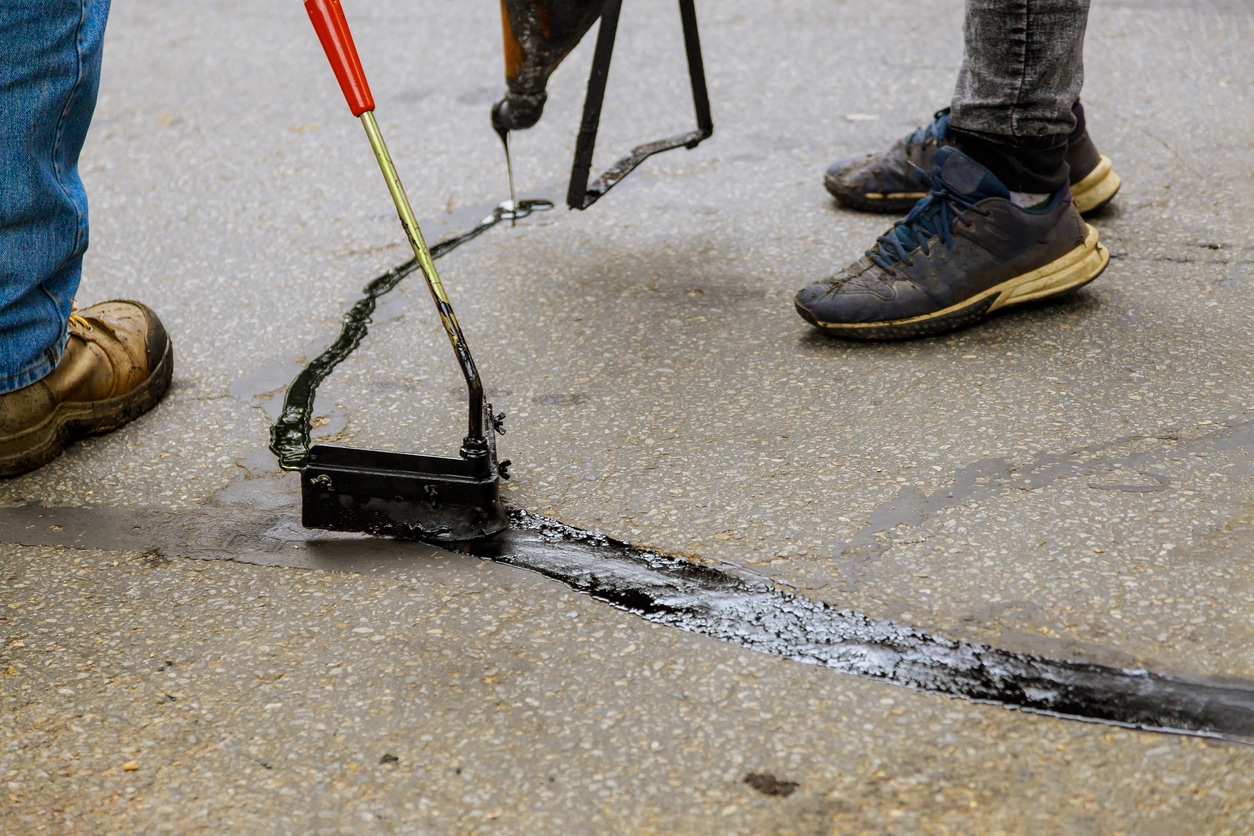Swift Solutions for Asphalt Patch Repair: Optimum Sealing Techniques
Swift Solutions for Asphalt Patch Repair: Optimum Sealing Techniques
Blog Article
Cold Mix Asphalt Vs. Hot Mix Asphalt: Which Is Right for You?

Composition Differences
Cold mix and hot mix asphalts differ dramatically in their composition, with distinct qualities that impact their efficiency and applications. Cold mix asphalt is produced by emulsifying the asphalt binder with water and an emulsifying agent prior to blending it with accumulation. This method permits for the asphalt to be workable at lower temperatures, making it perfect for momentary fixings and for usage in colder climate condition. Warm mix asphalt, on the various other hand, is made at high temperature levels, usually between 300-350 ° F, which aids to attain better compaction and a more resilient final item. The warm mix asphalt production procedure entails warming the accumulation and asphalt binder individually before combining them at the asphalt plant.
Furthermore, cold mix asphalt has a tendency to be less thick and a lot more flexible than hot mix asphalt. This flexibility makes it much better fit for locations with higher degrees of activity, such as driveways or roads with hefty website traffic. In contrast, warm mix asphalt is recognized for its high toughness and resistance to rutting and fracturing, making it a recommended selection for freeways and high-traffic roadways where long life is important.
Installment Process Variances
The process of mounting cold mix and hot mix asphalt displays remarkable differences in their needs and treatments. Cold mix asphalt, being a more flexible product, can be used straight from the bag or container onto the crater or harmed location. It calls for minimal preparation job, such as cleaning the area and condensing the cool blend with hand tools. This makes it a hassle-free choice for momentary and quick repairs. On the other hand, hot mix asphalt demands a more sophisticated installation procedure. It includes warming the blend to high temperatures before laying it down on a properly ready base. The prep work includes compacting the base, applying a tack coat, and making use of hefty machinery like pavers and compactors for a sturdy and smooth coating. Due to the heating demands, hot mix asphalt installations are commonly executed by specialists with specific equipment, making certain an extra irreversible and structurally audio result.
Durability and Durability Variables
When considering asphalt options, longevity and longevity are crucial factors to evaluate for long lasting pavement efficiency. Hot mix asphalt (HMA) is recognized for its remarkable resilience and durability.
In regards to durability, HMA usually outmatches CMA as a result of its superior strength and resistance residential or commercial properties. HMA pavements have a longer life span, calling for much less constant repair services and maintenance, which can equate to cost financial savings over time. Furthermore, HMA pavements are a lot more quickly customizable to satisfy particular project requirements, even more enhancing their longevity.
Price Factors To Consider
Thinking about the monetary effects is an essential element when assessing the option between warm mix asphalt (HMA) and cold mix asphalt (CMA) for sidewalk tasks. While the preliminary expense of hot mix asphalt is typically higher than that of cold mix asphalt, HMA commonly offers a more cost-efficient service in the long run due to its superior durability and long life.
Along with product costs, it's essential to take into consideration the expenses related to installment and upkeep when comparing HMA and CMA. HMA usually requires specific tools and skilled labor for appropriate installment, which can affect overall task costs. On the other hand, CMA is simpler to collaborate with and can frequently be used utilizing easier strategies, possibly decreasing installment costs. Ultimately, the decision between HMA and CMA need have a peek at this site to take right into account click this link not just the first price yet likewise the long-term economic effects to determine the most economical alternative for the details pavement task.
Environmental Impact Contrast
Contrast of the ecological influences in between hot mix asphalt (HMA) and cool mix asphalt (CMA) exposes distinctive distinctions in sustainability practices. HMA manufacturing requires high temperatures, leading to enhanced energy usage and greenhouse gas emissions.
Furthermore, making use of CMA commonly involves reusing existing asphalt pavement, advertising source preservation and lowering the quantity of waste sent to landfills. This recycling element even more enhances the sustainability of CMA contrasted to HMA. Overall, when thinking about the environmental influence, CMA emerges as a much more ecologically sustainable choice as a result of its reduced energy requirements, decreased discharges, and the possibility for reusing existing materials. By selecting CMA over HMA, roadway building tasks can contribute positively to ecological preservation initiatives.
Conclusion
To conclude, the option between cold mix asphalt (CMA) and warm mix asphalt (HMA) depends upon various elements such as composition, installation process, resilience, longevity, expense, and environmental impact. asphalt repair. While CMA supplies a fast and affordable remedy for small repairs, HMA ensures premium sturdiness and longevity for hefty web traffic areas. Take into consideration these aspects thoroughly to figure out which kind of asphalt is the ideal selection for your paving requires

Taking into consideration the economic effects is an essential element when examining the option in between hot mix asphalt (HMA) and cool mix asphalt (CMA) for sidewalk jobs. While the initial expense of hot mix asphalt is typically greater than that of cold mix asphalt, HMA commonly gives a much more cost-efficient option in the lengthy run due to its superior durability and longevity. cold mix asphalt.Contrast of the environmental impacts try this site between warm mix asphalt (HMA) and cold mix asphalt (CMA) exposes distinct differences in sustainability practices.In final thought, the choice between chilly mix asphalt (CMA) and warm mix asphalt (HMA) depends on numerous elements such as structure, setup procedure, sturdiness, longevity, price, and ecological influence
Report this page